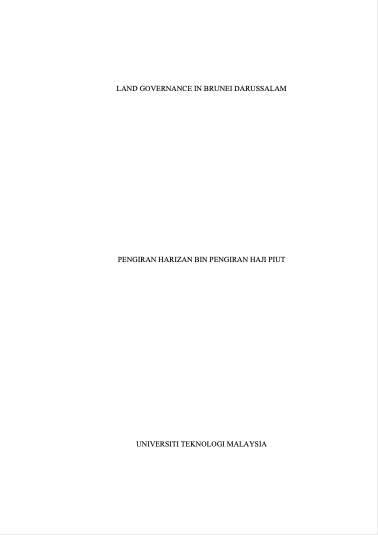Resource information
Land governance is proven to be significant in the development and survival of any nation. However, challenges associated with land governance have been a continuing debate as they keep changing due to the progress of any given society. Most researches on land governance have concentrated on the general aspects of land administration and management with reference to best practices of good governance. Very little research considers assessing land governance on the basis specific to capacity performance of any particular institution responsible in carrying out land administration and management. Recent substantiated studies suggest the need to explore such institution capacities based on realistic evidence to come up with precise scenario as well as viable solution to any related issues and problems. This thesis explores land governance in Brunei Darussalam by assessing one of its institution capacities in providing effective and efficient services to stakeholders. The first objective of the research concentrates on developing a conceptual framework and identifying suitable methods for performance assessment through diverse literature reviews and professional discussions. The framework is then utilized as a means to devise feasible query criteria for both professional interviews and a survey questionnaire. Findings from these instruments are then reinforced by applying the USAID-OCA Tool to come up with solid performance measurement conclusions, thus enabling the second objective of the study, namely to assess and present the performance analysis of land governance in the country. The outcome of the performance measurement indicated low institutional capacity in providing efficient and effective service delivery to stakeholders, with 88% of the institution governance criteria scores indicated low and basic capacity as opposed to good and high capacity. This finding is valuable to meet the third objective of the study which is to propose a viable solution to overcome issues and challenges related to land governance. A generic policy paper has been proposed to mitigate the said issues and challenges.

